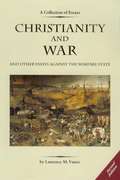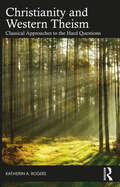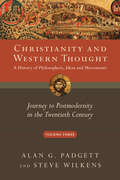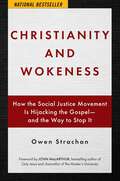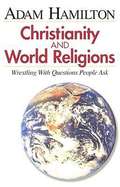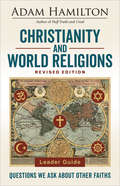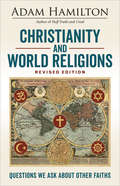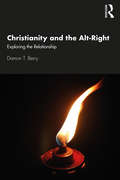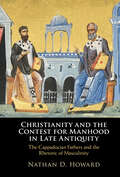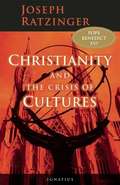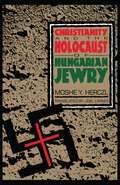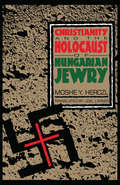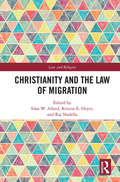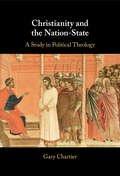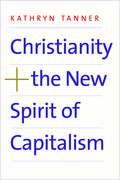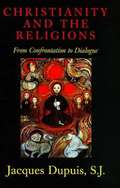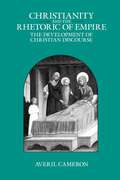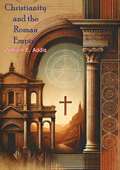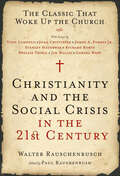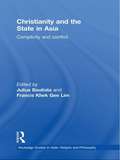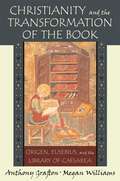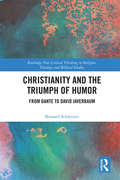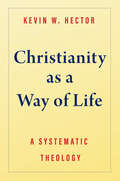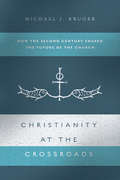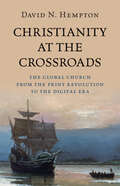- Table View
- List View
Christianity and War and Other Essays Against the Warfare State
by Laurence M. VanceThese essays, although organized under seven headings, have one underlying theme: opposition to the warfare state that robs us of our liberty, our money, and in some cases our life. Conservatives who decry the welfare state while supporting the warfare state are terribly inconsistent. The two are inseparable. Libertarians who are opposed to war on principle, but support the state's bogus "war on terrorism," even as they remain silent about the U.S. Global Empire, are likewise contradictory. Christians who condone the warfare state and its nebulous crusades against "evil" have been duped. There is nothing "Christian" about the state's aggressive militarism, its senseless wars, its interventions into the affairs of other countries, and its expanding empire.
Christianity and Western Theism: Classical Approaches to the Hard Questions
by Katherin A. RogersThis book explores central philosophical questions in Christian theology and doctrine through the perspectives of three of the most influential Christian thinkers: St. Augustine, St. Anselm, and St. Thomas Aquinas. Chapters analze long-contested debates around the Trinity, Original Sin, the Incarnation, Grace, Divine Foreknowledge and Free Will, the Afterlife, and Christian Exclusivity. From these topics emerge the "hard questions": How are ideas of monotheism and the Trinity reconciled? Is the doctrine of the Incarnation coherent? Why does God give grace to some and not others? How can the afterlife be understood? How should non-Christians be treated? Through a compelling comparative investigation of these ideas, Christianity and Western Theism uses the enduring concepts of three towering philosophers to show that Christian doctrine, though difficult, is coherent and, to some extent, understandable. As an engaging and accessible introduction to this topic, this book is the ideal resource for new students of Christian Thought, Christian Philosophy, Philosophy of Religion, and Medieval Philosophy.
Christianity and Western Thought: Journey to Postmodernity in the Twentieth Century (Christianity Western Thought #Volume 3)
by Steve Wilkens Alan G. PadgettChristianity Western Thought, Volume 1: From the Ancient World to the Age of Enlightenment
Christianity and Wokeness: How the Social Justice Movement Is Hijacking the Gospel - and the Way to Stop It
by Owen StrachanIn a world that is "woke," how many Christians are actually awake? This short, theologically sound primer is a resource for pastors, ministry leaders, community leaders, and other thinking Christians that explains carefully and clearly what Critical Race Theory and wokeness truly are, what the Bible teaches about race and ethnicity, why wokeness is distinct from Christianity and should be rejected, and how the church can work for unity based in the gospel of grace. Owen Strachan is a respected Reformed theologian and thought leader who can help Christians: Better understand Critical Race Theory, something very few do; Understand the high stakes—for the church and society at large—of wokeness as a movement; Think through America&’s complex past with nuance and sensitivity; Study how God has made humanity one through the imago Dei; Grasp the beauty of the biblical doctrine of ethnicity and &“race&”; and Be ready to work for unity in perilous times
Christianity and World Religions - Participant's Book
by Adam HamiltonAdam Hamilton, named by PBS's Religion and Ethics Newsweekly as one of the top "Ten People to Watch," has created an inviting new series of video-and-book studies on love and marriage, life issues, world religions, and Christian denominations. Hamilton calls these small-group studies "fishing expeditions," because they include tools for congregation wide and communitywide programs to draw in new members. Components include DVD, participant's book, leader's guide, and pastor's guide with CD-ROM. 6-8 sessions / 60-90 minutes Christianity and World Religions: Wrestling With Questions People Ask is a video-based small-group study and outreach program that explores four major world religions- Hinduism, Buddhism, Islam, and Judaism - and compares the beliefs of each with those of Christianity. This six-week study deals openly and honestly with questions people ask about other religions, including why we should believe the claims of Christianity over those of other faiths. As part of the study, author and presenter Adam Hamilton interviews a religious leader from each tradition. He treats the world religions with great respect, recognizing the unique contributions of each. In examining these major world religions and the beliefs of their followers, the Reverend Hamilton urges us as Christians to build bridges with others so that we might grow in our faith, seek peace in our world, love our neighbor, and find positive ways to share the gospel.For group or individual study, the book can be used by class participants during the study group meeting or at home for additional reflection. Includes detailed content for the six sessions.For more information about Adam Hamilton's studies, go to www.adamhamilton.cokesbury.com.
Christianity and World Religions Leader Guide Revised Edition: Questions We Ask About Other Faiths
by Adam HamiltonIn Christianity and World Religions, Pastor and best-selling author Adam Hamilton explores four major world religions—Hinduism, Buddhism, Islam, and Judaism—and the beliefs of each with those of Christianity. He deals openly and honestly with questions people ask about other religions like: Why are there so many different religions? How should Christians view other religions? How is God at work in other religions? What is the fate of those who earnestly pursue God through other religions?In examining these major world religions and the beliefs of their followers, Hamilton urges us as Christians to build bridges with others so that we might grow in our faith, seek peace in our world, love our neighbor, and find positive ways to share the gospel.The Leader Guide contains everything needed to guide a group through the six-week study including session plans, activities, and discussion questions, as well as multiple format options.
Christianity and World Religions Revised Edition: Questions We Ask About Other Faiths (Christianity and World Religions)
by Adam HamiltonIn Christianity and World Religions, Pastor and best-selling author Adam Hamilton explores four major world religions—Hinduism, Buddhism, Islam, and Judaism—and the beliefs of each with those of Christianity. He deals openly and honestly with questions people ask about other religions like: Why are there so many different religions? How should Christians view other religions? How is God at work in other religions? What is the fate of those who earnestly pursue God through other religions?In examining these major world religions and the beliefs of their followers, Hamilton urges us as Christians to build bridges with others so that we might grow in our faith, seek peace in our world, love our neighbor, and find positive ways to share the gospel.Additional components for a six-week study include a Leader Guide to help facilitate each weekly session and a DVD featuring Hamilton in 10-15 minute segments interviewing religious leader from each tradition.
Christianity and the Alt-Right: Exploring the Relationship
by Damon T. BerryChristianity and the Alt-Right: Exploring the Relationship looks back at the 2016 presidential election and the support President Trump enjoyed among white Evangelicals. This cutting-edge volume offers insights into the role of race and racism in shaping both the Trump candidacy and presidency and the ways in which xenophobia, racism, and religion intersect within the Alt-Right and Evangelical cultures in the age of Trump. This book aims to examine the specific role that Christianity plays within the Alt-Right itself. Of special concern is the development of what is called “pro-white Christianity” and an ethic of religious tolerance between members of the Alt-Right who are Pagan or atheist and those who are Christian, whilst also exploring the reaction from Christian communities to the phenomenon of the Alt-Right. Looking at the larger relationship between American Christians, especially white Evangelicals, and the Alt-Right as well as the current American political context, the place of Christianity within the Alt-Right itself, and responses from Christian communities to the Alt-Right, this is a must-read for those interested in religion in America, religion and politics, evangelicalism, and religion and race.
Christianity and the Contest for Manhood in Late Antiquity: The Cappadocian Fathers and the Rhetoric of Masculinity
by Nathan D. HowardIn this book, Nathan Howard explores gender and identity formation in fourth-century Cappadocia, where pro-Nicene bishops used a rhetoric of contest that aligned with conventions of classical Greek masculinity. Howard demonstrates that epistolary exhibitions served as 'a locus for' asserting manhood in the fourth century. These performances illustrate how a culture of orality that had defined manhood among civic elites was reframed as a contest whereby one accrued status through merits of composition. Howard shows how the Cappadocians' rhetoric also reordered the body and materiality as components of a maleness over which they moderated. He interrogates fourth-century theological conflict as part of a rhetorical battle over claims to manhood that supported the Cappadocians' theology and cast doubt on non-Trinitarian rivals, whom they cast as effeminate and disingenuous. Investigating accounts of pro-Nicene protagonists overcoming struggles, Howard establishes that tropes based on classical standards of gender contributed to the formation of Trinitarian orthodoxy.
Christianity and the Crisis of Cultures
by Joseph Cardinal Ratzinger Brian McneilIn this new work, written before his election to the Papal throne, Joseph Ratzinger addresses the "crisis of culture" that is evident in Europe today, and the serious problems that have resulted from that cultural crisis, a crisis that affects not only Europe but the West in general. Some of the results of the crisis are greater threats to security, growing poverty, the dangers of genetic engineering, and a decline in "moral energy. " Europe's Christian roots and foundation are being replaced by "modern Enlightenment philosophy" says the Pope. Such philosophies recognize only what can be mathematically or scientifically proven, and deny any metaphysical reality. The book is divided into three main sections titled: "The Crisis of Cultures"; "The Right of Life and Europe"; "What Doesit Mean to Believe?"
Christianity and the Holocaust of Hungarian Jewry
by Moshe Y HerczlBased on previously unknown materials, this book is &“absorbing and excellently translated . . . a valuable contribution to Holocaust scholarship&” (Association of Jewish Libraries). The complicity of the Hungarian Christian church in the mass extermination of Hungarian Jews by the Nazis is a largely forgotten episode in the history of the Holocaust. Using previously unknown correspondence and other primary source materials, Moshe Y. Herczl recreates the church&’s actions and its disposition toward Hungarian Jewry. Herczl provides a scathing indictment of the church&’s lack of compassion toward—and even active persecution of—Hungary&’s Jews during World War II. &“Demonstrates the crucial nexus between the long-held antipathy of the Catholic and Protestant churches in Hungary toward Hungarian Jewry and the deportation of more than 500,000 Hungarian Jews to Auschwitz in 1944.&” ―Religious Studies Review
Christianity and the Holocaust of Hungarian Jewry (Open Access Lib And Hc Ser.)
by Moshe Y. HerczlThe complicity of the Hungarian Christian church in the mass extermination of Hungarian Jews by the Nazis is a largely forgotten episode in the history of the Holocaust. Using previously unknown correspondence and other primary source materials, Moshe Y. Herczl recreates the church's actions and its disposition toward Hungarian Jewry. Herczl provides a scathing indictment of the church's lack of compassion toward—and even active persecution of—Hungary's Jews during World War II.
Christianity and the Law of Migration (Law and Religion)
by Silas W. Allard; Kristin E. Heyer; Raj NadellaThis collection brings together legal scholars and Christian theologians for an interdisciplinary conversation responding to the challenges of global migration. Gathering 14 leading scholars from both law and Christian theology, the book covers legal perspectives, theological perspectives, and key concepts in migration studies. In Part 1, scholars of migration law and policy discuss the legal landscape of migration at both the domestic and international level. In Part 2, Christian theologians, ethicists, and biblical scholars draw on the resources of the Christian tradition to think about migration. In Part 3, each chapter is co-authored by a scholar of law and a scholar of Christian theology, who bring their respective resources and perspectives into conversation through a conversation on key themes within migration studies. The work provides a truly interdisciplinary introduction to the topic of migration for those who are new to the subject; an opportunity for immigration lawyers and legal scholars to engage Christian theology; an opportunity for pastors and Christian theologians to engage law; and new insights on key frameworks for scholars who are already committed to the study of migration.
Christianity and the Nation-State: A Study in Political Theology
by Gary ChartierIn Christianity and the Nation-State, Gary Chartier provocatively offers readers unexpected critical distance from some familiar ways of understanding, justifying, and navigating existing political arrangements. People in multiple societies are posing important questions about the authority and functions of the contemporary nation-state and about potential alternatives to this seemingly inescapable institution. Chartier seeks to develop a distinctive theological response to the conditions prompting these questions. Affirming liberalism and cosmopolitanism, he reflects critically on nationalism, localism, religious establishment, and theological accounts of political authority. He highlights links between sin and state power and underscores deficiencies in democratic rhetoric and theory. He rejects the idea of a global government, advocating a nonterritorial alternative he labels 'radical consociationalism. Moreover, he presents concrete suggestions for life under the rule of the state.
Christianity and the New Spirit of Capitalism
by Kathryn TannerOne of the world’s most celebrated theologians argues for a Protestant anti-work ethic In his classic The Protestant Ethic and the Spirit of Capitalism, Max Weber famously showed how Christian beliefs and practices could shape persons in line with capitalism. In this significant reimagining of Weber’s work, Kathryn Tanner provocatively reverses this thesis, arguing that Christianity can offer a direct challenge to the largely uncontested growth of capitalism. Exploring the cultural forms typical of the current finance‑dominated system of capitalism, Tanner shows how they can be countered by Christian beliefs and practices with a comparable person‑shaping capacity. Addressing head‑on the issues of economic inequality, structural under- and unemployment, and capitalism’s unstable boom/bust cycles, she draws deeply on the theological resources within Christianity to imagine anew a world of human flourishing. This book promises to be one of the most important theological books in recent years.
Christianity and the Religions: From Confrontation to Dialogue
by Jacques Dupuis Phillip BerrymanIn this incisive and important volume, Jacques Dupuis offers new insights on the most important issue facing Christian theology today -- giving an account of Christian faith as Christians go more deeply along the road of dialogue and collaboration with the followers of other religious traditions. His task is to square a dogmatic circle. How does one do justice to the Gospel claim that Jesus the Christ is the final and universal savior of all humankind in every age, while also doing justice to the experience that truth, grace, holiness, and power are experienced in other religious traditions? In the first six chapters Dupuis reviews the history of the Western Christian tradition's teaching on other religious Ways through the breakthrough at Vatican Council II. In chapters 7 and 8 he reviews the critical issues of uniqueness of Christ and Christian proposals to account for the mediation of salvation in other religious Ways. He discusses also the relationship between the Reign of God, the Church, and the Religions. In chapter 9 he explores the nature and role of dialogue in a pluralistic society. In chapter 10 offers sage reflections on inter-religious prayer.
Christianity and the Rhetoric of Empire: The Development of Christian Discourse (Sather Classical Lectures #55)
by Averil CameronMany reasons can be given for the rise of Christianity in late antiquity and its flourishing in the medieval world. In asking how Christianity succeeded in becoming the dominant ideology in the unpromising circumstances of the Roman Empire, Averil Cameron turns to the development of Christian discourse over the first to sixth centuries A.D., investigating the discourse's essential characteristics, its effects on existing forms of communication, and its eventual preeminence. Scholars of late antiquity and general readers interested in this crucial historical period will be intrigued by her exploration of these influential changes in modes of communication.The emphasis that Christians placed on language—writing, talking, and preaching—made possible the formation of a powerful and indeed a totalizing discourse, argues the author. Christian discourse was sufficiently flexible to be used as a public and political instrument, yet at the same time to be used to express private feelings and emotion. Embracing the two opposing poles of logic and mystery, it contributed powerfully to the gradual acceptance of Christianity and the faith's transformation from the enthusiasm of a small sect to an institutionalized world religion.
Christianity and the Roman Empire
by William E. AddisChristianity and the Roman Empire by William E. Addis offers a thorough exploration of the growth and eventual dominance of Christianity within the Roman world. Written with scholarly depth, the book traces the origins of Christianity, its development in the context of the Roman Empire, and its transformation from a persecuted sect into the official religion of the state.Addis begins by examining the historical and cultural environment of the Roman Empire during the rise of Christianity, showing how the political, philosophical, and religious landscape shaped early Christian thought. He discusses the challenges faced by early Christians, including state-sponsored persecution, internal doctrinal disputes, and tensions with both Jewish and pagan communities. Through this lens, readers gain insight into the resilience and adaptability of the early church.The narrative progresses through pivotal moments, such as the spread of Christian teachings through missionary work, the writings of early Church Fathers, and the role of martyrdom in strengthening the faith. Addis also highlights the impact of key events, including Constantine’s conversion and the Edict of Milan, which marked the beginning of Christianity’s ascent to imperial favor.The book delves into the complex relationship between Christian doctrine and Roman governance, illustrating how Christianity influenced the moral, social, and political fabric of the empire. Addis reflects on how the alliance between church and state shaped both institutions, laying the groundwork for the development of medieval Christendom.Christianity and the Roman Empire provides readers with a nuanced understanding of the intersection between faith and power in ancient history. For those interested in early Christianity, Roman history, or the dynamics of religious transformation, Addis’s work offers a compelling and informative account of a pivotal period in the history of Western civilization.
Christianity and the Social Crisis in the 21st Century: The Classic That Woke Up the Church
by Walter Rauschenbusch“A book which left an indelible imprint on my thinking.” — Rev. Dr. Martin Luther King, Jr.Republication in this form is a forceful intervention in contemporary debates in American religion and politics. — CommonwealMany of the societal concerns and questions of 1907, e.g., his alarm over iner-city poverty, societal injustice, crime, and ineffectual government, are just as relevant today. — Library Journal“Skillfully fashioned and perfectly timed, [Rauschenbusch’s] book was a supercharger for a movement . . . and set a new standard for political theology. Rightly viewed from the beginning as the greatest statement of the social gospel movement.” — Christian CenturyIn a 100th-anniversary edition, Paul Raushenbush, the author’s great-grandson, has reprinted the text with essays by Cornel West, the Rev. Jim Wallis and others to prove that one can be a dedicated Christian and a social reformer at the same time. — The New York Times Book ReviewRightly viewed from the beginning as the greatest statement of the social gospel movement . . . and set a new standard for political theology. — Christian Century
Christianity and the State in Asia: Complicity and Conflict
by Julius Bautista Francis Khek Gee LimChristianity is one of the most rapidly growing religions in Asia. Despite the challenges of political marginalisation, church organisations throughout much of Asia are engaged in activities - such as charity, education and commentary on public morality - that may either converge or conflict with the state's interests. Considering Christianity’s growing prominence, and the various ways Asian nation states respond to this growth, this book brings into sharper analytical focus the ways in which the faith is articulated at the local, regional, and global level. Contributors from diverse disciplinary and institutional backgrounds offer in-depth analyses of the complex interactions between Asian nation-states and Christianity in the context of modernisation and nation-building. Exploring the social and political ramifications of Christian conversions in Asia and their impact on state policies, the book analyses how Christian followers, missionaries, theologians and activists negotiate their public roles and identities vis-à-vis various forms of Asian states, particularly in the context of post-colonial nation-building and socio-economic development. This volume represents a critical contribution to the existing scholarship on Christianity's global reach and its local manifestations, and demonstrates the significance of the Asian experience in our understanding of Christianity as a global religion.
Christianity and the Transformation of the Book: Origen, Eusebius, and the Library of Caesarea
by Anthony GraftonChristianity and the Transformation of the Book combines broad-gauged synthesis and close textual analysis to reconstruct the kinds of books and the ways of organizing scholarly inquiry and collaboration among the Christians of Caesarea, on the coast of Roman Palestine. The book explores the dialectical relationship between intellectual history and the history of the book, even as it expands our understanding of early Christian scholarship.
Christianity and the Triumph of Humor: From Dante to David Javerbaum (Routledge New Critical Thinking in Religion, Theology and Biblical Studies)
by Bernard SchweizerThis book traces the development of religious comedy and leverages that history to justify today’s uses of religious humor in all of its manifestations, including irreverent jokes. It argues that regulating humor is futile and counterproductive, illustrating this point with a host of comedic examples. Humor is a powerful rhetorical tool for those who advocate and for those who satirize religious ideals. The book presents a compelling argument about the centrality of humor to the story of Western Christianity’s cultural and artistic development since the Middle Ages, taking a multi-disciplinary approach that combines literary criticism, religious studies, philosophy, theology, and social science. After laying out the conceptual framework in Part 1, Part 2 analyzes key works of religious comedy across the ages from Dante to the present, and it samples the breadth of contemporary religious humor from Brad Stine to Robin Williams, and from Monty Python to South Park. Using critical, historical, and conceptual lenses, the book exposes and overturns past attempts by church authorities, scholars, and commentators to limit and control laughter based on religious, ideological, or moral criteria. This is a unique look into the role of humor and comedy around religion. It will, therefore, be of great interest to scholars of Religious Studies, Humor Studies, and the Sociology of Religion.
Christianity as a Way of Life: A Systematic Theology
by Kevin W HectorFocusing on Christianity’s core practices, a leading theologian imagines Christianity as a way of life oriented toward wisdom In this book, Kevin W. Hector argues that we can understand Christianity as a set of practices designed to transform one’s way of perceiving and being in the world. Hector examines practices that reorient us to God (imitation, corporate singing, eating together, friendship, and likemindedness), that transform our way of being in the world (prayer, wonder, laughter, lament, and vocation), and that reshape our way of being with others (benevolence, looking for the image of God in others, forgiveness, and activism). Taken together, the aim of these practices is to transform one’s way of perceiving and acting in the face of success and failure, risk and loss, guilt and shame, love, and loss of control. These transformations can add up to a transformation of one’s very self. To make sense of Christianity as a way of life, in turn, these practices must be understood within the context of Christian beliefs about sin, Jesus, redemption, and eternal life. Understanding them thus requires a systematic theology, which Hector offers in this clear-eyed, ambitious, and elegant interpretation of the Christian tradition.
Christianity at the Crossroads: How the Second Century Shaped the Future of the Church
by Michael J. KrugerThe Gospel Coalition Christianity at the Crossroads
Christianity at the Crossroads: The Global Church from the Print Revolution to the Digital Era
by David N. HemptonCombining expansive storytelling with striking analysis of 'networks, nodes, and nuclei', David Hempton's new book explains major developments in global Christianity between two communication revolutions: print and the internet. His novel approach (replete with vivid metaphor – we read of wildflower gardens and fungi, of exploding fireworks sending sparks of possibility in all directions, and of forests with vast interconnected root systems hidden below our vision) allows him to look beyond institutional hierarchies, traverse national and denominational boundaries, and think more deeply about the underlying conditions promoting, or resisting, adaptation and change. It also enables him to explore the crossroads, or junction boxes, where individuals and ideas encountered different traditions and from which something fresh and dynamic emerged. Cogently addressing the rise of empires, transformation of gender relations, and demographic shifts in world Christianity from the West to the Global South, this book is a masterful contribution to contemporary religious history.
